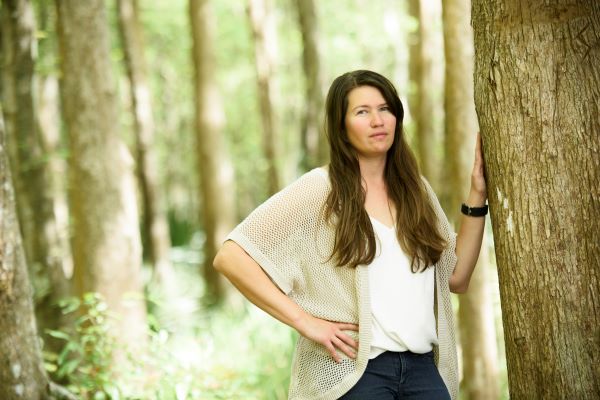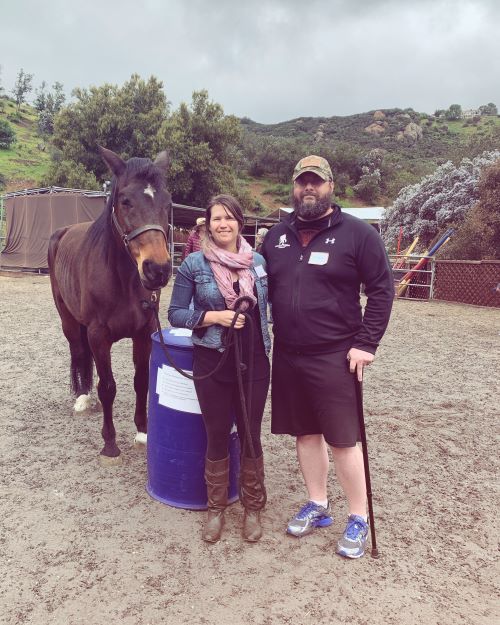Taking on Trauma: What Loved Ones Need to Know About Secondary PTSD

Jenna Malone was helping her husband Issac navigate his post-traumatic stress disorder (PTSD) when she began to notice her behavior changing.
As a mom of three, Jenna was always safety conscious but realized she would get triggered even when she was not with Issac. “I was starting to react to things that he would react to, for example, a large crowd or loud noises. I felt more hypervigilant in my surroundings,” Jenna said.
Eventually, Jenna learned she was experiencing secondary trauma symptoms – also known as indirect trauma. These symptoms affect family members and caregivers of veterans managing PTSD.
According to the most recent Warrior Survey* by Wounded Warrior Project® (WWP), 76% of registered warriors self-reported PTSD or symptoms of PTSD. While symptoms vary, the effects are far-reaching, challenging not only warriors’ daily activities but the overall quality of life for them and their loved ones as well.
“It is a common experience we hear. When a person is living with PTSD, we see families begin to adapt to the individual and take on compensatory behaviors, which, over time, takes a toll on the whole family,” said Erin Fletcher, Psy.D., director of Warrior Care Network® at WWP™. “For instance, if a warrior deals with PTSD triggers through avoidance, family members start isolating themselves, too.”
Dr. Fletcher added that it's not uncommon to hear family members say things like, “We need to keep our voices down because Mom or Dad doesn’t like loud noise.” Or “We can't attend this or that because Dad or Mom isn’t comfortable with crowds.”
Family members may feel extra stress trying to meet the veteran’s needs while not having their own needs met. Tempers become shorter, anxiety increases, and family members may turn to unhealthy coping mechanisms, such as eating too much or not enough and self-medicating with drugs or alcohol. Dr. Fletcher noted that physical symptoms, including stomachaches and headaches, are often common among children.
“Eventually, the entire family has difficulty communicating, trusting, and feeling safe, but with education, positive change is possible,” said Dr. Fletcher, noting that part of WWP’s mission is to increase awareness and bring attention to not only warriors managing PTSD but also support family members facing secondary trauma. “We encourage loved ones to seek treatment for themselves as they learn how to support their loved one’s recovery.”

Jenna and Issac were introduced to equine therapy through Warrior Care Network. The couple still enjoys the activity and recently acquired two horses so they can include the whole family.
Despite being engaged with WWP through a caregiver workshop, Jenna knew she needed extra help after her symptoms escalated to panic attacks. Jenna connected with WWP Talk, a free, nonclinical, telephonic program that assists warriors and family members. During weekly emotional support calls, participants work individually with a dedicated WWP Talk partner.
“It was extremely helpful [for me] just to talk out some of the things that I just needed to get off my chest or just work through,” said Jenna, who learned to manage her own symptoms while continuing to be supportive of her spouse.
Jenna said she better understood what her husband dealt with and how to navigate their relationship more effectively while attending couples counseling during Issac’s participation in Warrior Care Network,® an accelerated outpatient treatment program.
“I didn't fully understand what Issac was struggling with before. But when we went to Warrior Care Network, we were finally given the tools to really communicate,” said Jenna, adding that after the couple came home, they spent time talking to their children about what Issac was experiencing and educating them on new ways to work through anxiety, anger, and other emotions.
“Learning these new skills helped us improve our relationship with each other. And the kids noticed the difference in how we interacted together and individually toward them,” said Jenna. “I am thrilled to be able to pass on healthier coping skills.”
Based on experiences at Warrior Care Network, Jenna said the family has also embraced art therapy and equine therapy to help maintain their mental health, noting they recently relocated to a farm and adopted two horses.
Learn more about WWP’s programs and services, which help warriors and their loved ones on their journey to more positive mental health.
Contact: Cynthia Weiss – Public Relations, cweiss@woundedwarriorproject.org, 904.738.2589
About Wounded Warrior Project
Since 2003, Wounded Warrior Project® (WWP) has been meeting the growing needs of warriors, their families, and caregivers, helping them achieve their highest ambitions. Learn more.
*Warrior Survey, Wave 2 (conducted June 15-Aug. 24, 2022)